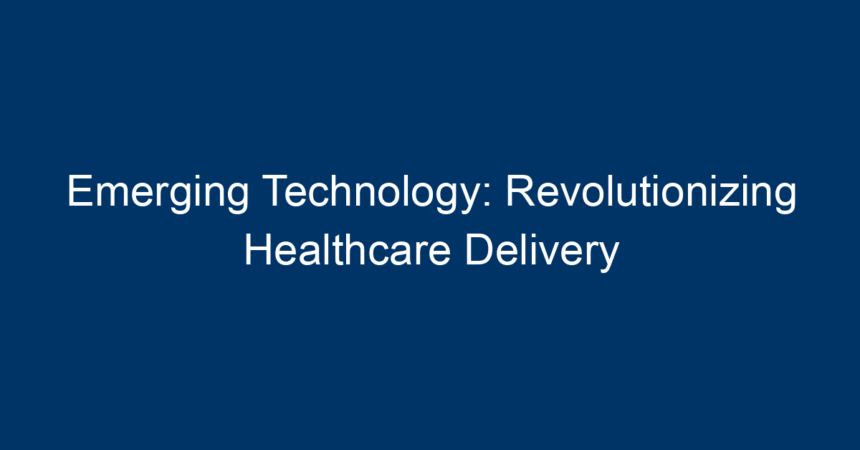In the heart of our modern world, emerging technology is reshaping virtually every industry, and healthcare is no exception. From telemedicine to artificial intelligence (AI), the innovations that are taking hold in the medical field are not just incremental changes; they represent a fundamental transformation in how care is delivered. For patients and healthcare providers alike, these advancements are promoting better outcomes, enhancing accessibility, and ultimately defining the future of health services. This article explores the exciting ways emerging technology is revolutionizing healthcare delivery.
The Role of Emerging Technology in Healthcare
1. Telemedicine: Bridging the Gap
Telemedicine has rapidly gained traction, particularly in the wake of the COVID-19 pandemic. This service enables healthcare professionals to consult with patients remotely, breaking geographical barriers and expanding access to quality care. Patients can receive consultations via video calls or messaging platforms, ensuring that those in rural or under-served areas can still connect with healthcare providers.
Benefits of Telemedicine:
- Convenience: Patients can attend appointments from the comfort of their homes.
- Increased Access: More individuals can access specialist care without extensive travel.
- Cost-Effectiveness: Reduced overhead costs can translate to lower prices for patients and insurers.
2. Artificial Intelligence (AI): Enhancing Decision-Making
AI is becoming a game-changer in the healthcare industry. By analyzing vast amounts of data, AI algorithms can assist healthcare professionals in diagnosing diseases, predicting patient outcomes, and personalizing treatment plans.
Applications of AI in Healthcare:
- Diagnostic Accuracy: Tools like IBM Watson Health analyze medical records and imaging to improve diagnostic precision, reducing human error.
- Predictive Analytics: AI can evaluate data trends, enabling proactive healthcare interventions that can prevent hospitalizations.
- Operational Efficiency: AI can streamline administrative processes, freeing healthcare workers to focus more on patient care rather than paperwork.
3. Wearable Technology: Empowering Patients
Wearable technology is making waves in personal health monitoring. Devices like smartwatches and fitness trackers help users keep tabs on vital signs, activity levels, and even stress indicators.
Benefits of Wearable Technology:
- Real-Time Monitoring: Continuous data collection can provide healthcare professionals with immediate insights into a patient’s condition.
- Encouraging Healthy Habits: Wearables often come with health-related apps that encourage users to maintain healthier lifestyles through reminders and goal-setting.
- Chronic Disease Management: Patients with conditions such as diabetes can track their glucose levels in real time, allowing for effective self-management.
4. Blockchain: Securing Patient Data
As data breaches become increasingly common, blockchain technology offers a secure solution. By creating decentralized databases, blockchain can ensure that patient information is not only secure but also accessible only to authorized individuals.
Key Benefits of Blockchain in Healthcare:
- Enhanced Privacy: With encryption and decentralized storage, patient data remains secure against unauthorized access.
- Improved Interoperability: Blockchain could facilitate seamless data sharing between multiple healthcare providers, enhancing care coordination.
- Transparent Transactions: This technology enables auditing healthcare transactions, reducing fraud and promoting trust among providers and patients.
5. Robotics: Revolutionizing Surgery
Robotic-assisted surgery is transforming the surgical landscape, allowing for greater precision and minimally invasive procedures. These advancements result in reduced recovery times and less post-operative pain for patients.
Applications of Robotics:
- Precision Surgery: Robotic systems like the da Vinci Surgical System allow surgeons to perform complex procedures with enhanced accuracy.
- Tele-Surgery: Surgeons can operate remotely, enabling access to expertise even in remote locations.
- Training and Simulation: Robotics in education helps train new surgeons in a safe environment, honing their skills before practicing on patients.
Challenges in Implementing Emerging Technology
Despite the remarkable potential of emerging technologies, several challenges must be addressed to fully realize their benefits in healthcare.
1. Data Privacy Concerns
The integration of technology in healthcare raises significant concerns surrounding patient data privacy. While advancements like blockchain offer solutions, healthcare organizations must ensure compliance with regulations such as HIPAA to protect sensitive information.
2. High Initial Costs
Implementing advanced technologies can be costly, particularly for smaller healthcare facilities. Investment in training and infrastructure must be weighed against the potential long-term benefits of improved patient care.
3. Resistance to Change
Healthcare professionals may resist adopting new technologies due to familiarity with traditional methods. Overcoming this requires continuous education and demonstrating the value of emerging technologies.
Actionable Insights for Healthcare Providers
As emerging technology continues to evolve, healthcare providers can take several proactive steps to integrate these tools into their practice:
- Stay Informed: Keep abreast of the latest trends and innovations in emerging technology to adopt solutions that best suit your practice.
- Invest in Training: Provide ongoing training for your staff to help them adapt to new technologies, ensuring they can utilize these tools effectively.
- Engage Patients: Educate your patients about the benefits of telemedicine, wearable technology, and other innovations, encouraging their participation in their healthcare journey.
- Focus on Security: Prioritize data security, investing in technologies that protect patient information while allowing for data sharing when appropriate.
Conclusion
Emerging technology is truly revolutionizing healthcare delivery in various meaningful ways. From enhancing patient access through telemedicine to improving treatment outcomes with AI and robotics, the advancements are profound. However, healthcare providers must navigate challenges such as data privacy and initial costs to fully embrace these tools.
Taking actionable steps to integrate emerging technologies into healthcare practices will not only improve patient outcomes but also streamline operations and foster a culture of innovation. As we move forward, embracing these changes will be crucial in realizing a healthcare system that is more efficient, effective, and equitable for everyone.
The future of healthcare is bright, and it is powered by emerging technology. Are you ready to join the revolution?




